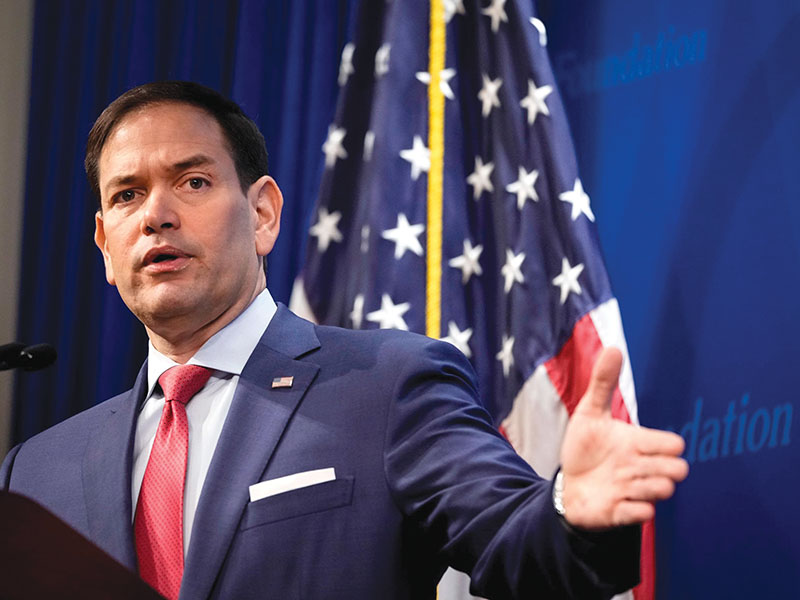
Secretary of State Marco Rubio: selection process intervention
Eleven members of the 12-person Fulbright Foreign Scholarship Board (FFSB) have resigned over what they say is political interference in the selection process for recipients of this prestigious international grant, according to sources familiar with the program and a letter announcing their resignation.
FFSB normally has final say in the selection process, after initial application reviews by the Institute for International Education and host countries’ Fulbright commissions. This year was different. Inside Higher Ed broke the story in May that Secretary of State Marco Rubio directed State Department officials to intervene in the final stages of the selection process, adding a new step to cull proposals they felt did not comply with President Trump’s anti-DEI (diversity, equity and inclusion) executive orders.
In their letter, posted to Substack on June 11, the former board members wrote that the State Department’s “unprecedented” intervention in the selection process is illegal and unethical and compromised national diplomatic and research interests. “Under Democratic and Republican administrations alike, the Board has followed the law, operating with independence pursuant to its statutory mandate,” they wrote. “The current administration has usurped the authority of the Board and denied Fulbright awards to a substantial number of individuals who were selected.”
Sources familiar with the program, who spoke with Inside Higher Ed on background to avoid retaliation, said State Department officials — led by Darren Beattie, under-secretary for diplomacy and public affairs — rejected more than 20 percent of the FFSB’s selected finalists in a last-minute intervention. For example, of the approximately 900 approved applicants for the U.S. Visiting Scholars program, Beattie vetoed roughly 200.
Many of the scholars culled had focused on the effects of climate change and gender disparities; others seemed to have been vetoed based on their inclusion of words that triggered an anti-DEI keyword search that State Department officials used to conduct their final review, according to sources inside the selection process who shared details with Inside Higher Ed in May.
A person familiar with FFSB said the board members felt they had no choice but to resign. FFSB is a politically appointed board; the members who just resigned were indeed all appointed by President Biden. Their resignations now open up 11 FFSB seats, which are usually term-limited, to Trump appointees. One person familiar with the Fulbright program said the board members had factored this into their decision to resign. But after being shut out from the end of the selection process, the board members felt they had to leave. “To continue to serve after the Administration has consistently ignored the Board’s request that they follow the law would risk legitimising actions we believe are unlawful and damage the integrity of this storied program and America’s credibility abroad,” the members wrote in their letter.
Unintended consequences
If college presidents were hoping President Donald Trump would tire of lambasting America’s universities, his latest tirades against international students have left them freshly agog. On June 4, Trump escalated his attacks against Harvard, issuing an order suspending the university from a student-visa programme, which would stop foreigners from attending. Of wider impact is the government’s decision to pause scheduling new visa interviews for foreign students, no matter where they aim to study. Beyond the damage this is doing to America’s reputation, and its prowess in research, the tumult has bean-counters across the country’s higher-education system wringing their hands.
Many American colleges and universities were facing financial problems long before Trump’s return to the White House. Americans have soured on higher education, after years in which participation grew fast. The share of high-school leavers going straight to college fell from around 70 percent in 2016 to 62 percent in 2022. Last December, Moody’s, a rating agency, said a third of private universities and a fifth of public ones are operating in the red.
Foreign students are not an antidote, but they are helping offset some pain. The million or so foreigners studying in America are roughly double the number of 2000. They pay far higher fees than locals for undergraduate courses — in some public universities as much as three times the rate, says William Brustein, who has led international strategy at several of them. Over half the foreigners are postgraduates; these courses tend to bring outsize profits.
Though America has more foreign students than any other country, it seems to have room for more: they make up only about 6 percent of students in higher education, compared with over 25 percent in each of its main competitors — Britain, Australia and Canada. For now, alas, growth is the last thing anyone expects. The risk is both that the number of foreigners who turn up this autumn will fall sharply, and of a longer-lasting depression caused by future applicants turning to countries that are more welcoming than America.
The big question is who might suffer the most if there is a bust. Ultra-elite institutions may look exposed: around 28 percent of Harvard’s students and a whopping 40 percent at Columbia come from abroad. But these institutions have many ways to balance the books. Last year tuition fees (both domestic and foreign) and payments for room and board made up only about 20 percent of Harvard’s total income, compared with over 80 percent at least prestigious private universities. Demand for admission into the highest-ranking universities is rarely affected by a slowdown and their home-grown students could pay more. The trouble might be greater for second-and third-tier institutions, where foreign students are not quite so numerous but are often more important to the bottom line.
A pronounced slowdown in overseas arrivals could damage institutions, even those that have never enrolled a single foreigner. If highly regarded universities adapt by enrolling more local students, that will make it harder for institutions with lesser reputations to attract them, and thus to pay their bills. In Britain, changes to visa rules have recently brought sharp falls in arrivals of foreign students. Last year, about 40 percent of universities predicted operating deficits.
This would not be a problem if it were to put shoddy and unpopular institutions out of business. But it is a worry if it leads to regional “cold spots” in which affordable degrees become difficult to find. Or if it benefits complacent incumbents that trade on their reputation rather than their teaching. Trump’s war on the Ivy League could have much wider effects than he bargained for.
Also Read: United States: Self-correction at Harvard























